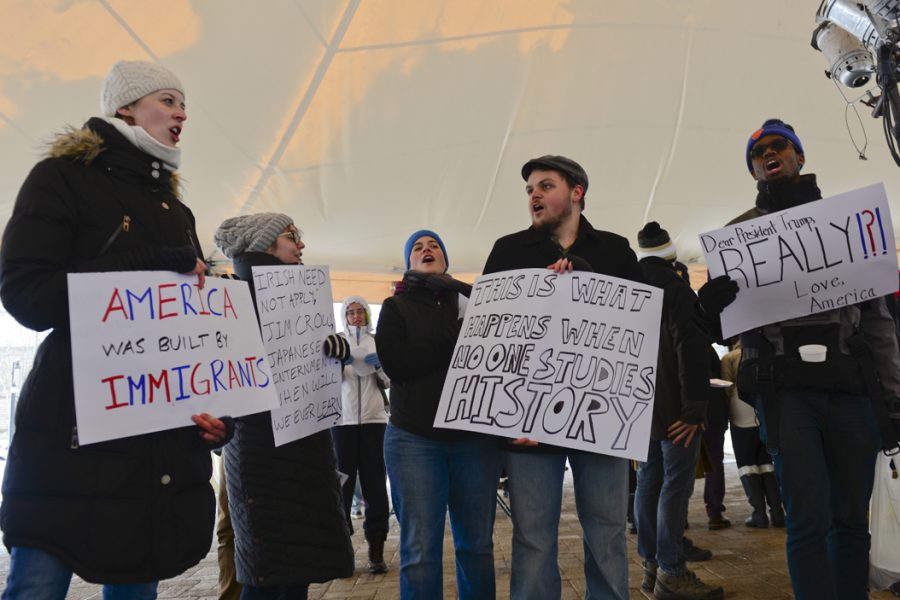Setareh Sarachi stood in a crowd huddled under the Pittsburgh Parks Conservancy tent in Schenley Plaza Thursday afternoon, surrounded by protesters guarding their signs against the swirling winter weather.
The group was there, starting at noon, for the “Academics United – No Visa and Immigration Ban: Pittsburgh” event hosted by the Iranian Student Association of Pittsburgh. Sarachi, a second-year master’s student of information science, was in attendance not only as a member of the association but also as someone impacted by President Donald Trump’s travel ban, the central issue of the event.
Sarachi will graduate in the spring, and she is sure her mother, an Iranian citizen, will not be able to attend.
“Everybody’s so confused,” she said. “Everybody’s hopeful for something, but at the end, we all know that’s not going to happen. She’s not going to be here.”
Almost as if the small gathering had an immediate affect, a San Francisco-based Ninth Circuit Court of Appeals refused to uphold Trump’s immigration orders in a 3-0 vote later that night. The President fired back in an angry all-caps tweet, writing “See you in court! The security of our nation is at stake!”
But those gathered on Thursday, including Sarachi, said they were already concerned about their security. As an Iranian, the process of coming to the U.S. involves applying for a visa outside of Iran, doing an interview and going through a vetting process.
“My mom was supposed to go for her interview on February the 15th in Armenia because we don’t have a U.S. embassy,” Sarachi said. “After this executive order, they cancelled all appointments, and they are not giving any new appointments until further notice.”
Members of the Iranian Student Association — students from Pitt and Carnegie Mellon University — and members of the community who oppose the ban waited in line Thursday to order food from the Conflict Kitchen, a restaurant that features rotating menus from nations with which the United States is in conflict. The menu featured pan-fried potato and onion patties and barberry rice, among other Iranian dishes, in a one-day-only selection in solidarity with the gathering.
Senior Abrisham Eskandari, who was waiting in line to order, said her family has also put a halt on any visits in the near future.
“[The situation is] a hopeless thing, because I know for sure they can’t come here,” the chemistry major said.
In addition to concerns regarding her family, Eskandari said she is worried about the global effects of the ban.
“You also kind of wonder what else could happen,” she said. “I’m Iranian-American, dual national. So if the U.S. isn’t allowing dual nationals from England, what’s England going to do? Would England try to oppose this law by saying ‘OK, American dual nationals can’t get visas to visit us’?”
Yashar Aucie, president of the Pitt ISA, spoke with The Pitt News just a few weeks ago about how his sister had been detained for four hours at the airport trying to return from a family visit in Iran. He felt comforted hearing similar experiences from others, but couldn’t help wishing that more had braved the blustery day.
“Unfortunately, it got cold — we were expecting much more people,” he said, adding that “it was great because we had nice stories.”
In addition to those who were directly affected, students and lecturers from Pitt and CMU came to spread the word about other immigration initiatives, such as a petition to make Pitt a sanctuary university.
Sarah Leavens, a lecturer for Pitt’s English Department, handed out flyers urging people to sign on. Among the petition’s requests were that Pitt add immigration status to its equality clause, which lists attributes protected against discrimination, and that the University not share immigration statuses of its students with federal investigators.
As the event came to a close, the speakers asked members of the crowd to raise their hand if they wanted a hug. As hands started to pop up, protesters turned to each other and embraced.
“We just believe in everyone being protected,” Leavens said.
By the end of the day Thursday, Sarachi had heard the news of the San Francisco court’s decision.
“I think all the supports and movements are being seen and heard,” she said. “We are still hoping for the best to happen.”


